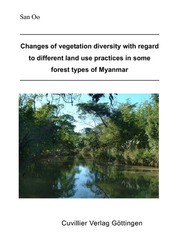| Departments | |
|---|---|
| Book Series (96) |
1381
|
| Nachhaltigkeit |
3
|
| Gesundheitswesen |
1
|
| Humanities |
2370
|
| Natural Sciences |
5408
|
| Mathematics | 229 |
| Informatics | 319 |
| Physics | 980 |
| Chemistry | 1364 |
| Geosciences | 131 |
| Human medicine | 243 |
| Stomatology | 10 |
| Veterinary medicine | 108 |
| Pharmacy | 147 |
| Biology | 835 |
| Biochemistry, molecular biology, gene technology | 121 |
| Biophysics | 25 |
| Domestic and nutritional science | 45 |
| Agricultural science | 1005 |
| Forest science | 201 |
| Horticultural science | 20 |
| Environmental research, ecology and landscape conservation | 148 |
| Engineering |
1795
|
| Common |
98
|
|
Leitlinien Unfallchirurgie
5. Auflage bestellen |
|
Advanced Search
Changes of vegetation diversity with regard to different land use practices in some forest types of Myanmar (English shop)
San Oo (Author)Preview
Table of Contents, Datei (140 KB)
Extract, Datei (170 KB)
Tropical ecosystems are exceptionally rich and exclusive reservoirs of much of the biodiversity on earth. However, the rapid and extensive destruction of tropical habitats has become a serious threat to their native biota. Deforestation is particularly severe in Southeast Asia, where natural habitats, such as lowland rain forests, are destroyed at relative rates that are higher than those of other tropical regions. The conversion of this natural habitat to other land uses is the major driving force behind worldwide biodiversity loss (Sodhi et al., 2004). It can clearly be noticed that biodiversity decline is mainly the result of human activities and the loss of the world’s biological diversity, mainly from habitat destruction, overharvesting, pollution and inappropriate introduction of foreign plants and animals, is continuing. Among different land uses, shifting cultivation, logging and grazing play a key role in the process of deforestation. Although not more than approximately 90% of the world’s food for humans comes from just 15 plant species and 8 animal species, both human health and sustainably high agricultural productivity depend on the preservation of diverse biota, consisting of the estimated 10 million species of plants and animals that inhabit the planet (Pimental et al., 1992). The loss of forests also results in depleting natural resources and diminishing supports for the survival of humans.
| ISBN-13 (Printausgabe) | 3865378595 |
| ISBN-13 (Hard Copy) | 9783865378590 |
| ISBN-13 (eBook) | 9783736918597 |
| Final Book Format | A5 |
| Language | English |
| Page Number | 171 |
| Edition | 1 |
| Volume | 0 |
| Publication Place | Göttingen |
| Place of Dissertation | Göttingen |
| Publication Date | 2006-05-24 |
| General Categorization | Dissertation |
| Departments |
Forest science
|








